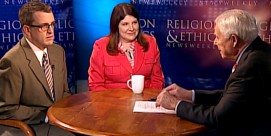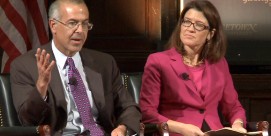READ TRANSCRIPTE. J. DIONNE (Brookings Institution): There is something different here. I think there are three things: one—there is a radicalism and an urgency to what he is saying and you read the language of this latest document and in so many places, he talks about a deified market. He talks about a system which tends to devour everything which stands in the way of increased profits. He talks about defenseless beings and so I think we cannot deny that he has given a higher priority to the church’s social teachings, to our obligations to the poor, and to criticism of an unjust economy than we have heard in a long time; not that he is inconsistent with John Paul or Benedict because they said some tough things about the market as well, but I think this is so central to who he is.
MICHAEL GERSON: I would say that the heart, that for all of this discussion, the reason that Francis is powerful and attractive to so many is because he talks about Jesus and because he acts like Jesus. And that is the source of power and authority in the Christian church in all of its expressions. And I would only conclude by saying that a church that looked like this would transform the entire world.
In This Episode << SLIDE LEFT TO SEE ADDITIONAL SEGMENTS
At a December 2 program at Georgetown University, two prominent Washington columnists, E.J. Dionne and Michael Gerson, assess Pope Francis’s call for the Catholic Church not only to make caring for the poor a higher priority but also to work for a more just economic system.





